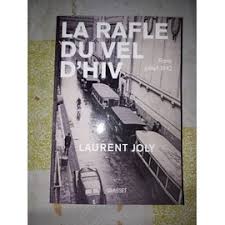 Called “Vel d’Hiv” roundup, is one of the most tragic events that occurred in France during the Occupation. In less than two days, on July 16 and 17, 1942, 12,884 women, men and children, divided between Drancy (nearly 4,900) and Vel d’Hiv (8,000), were arrested by the Parisian police at the result of a criminal arrangement between the German authorities and the Vichy government. Only a few hundred of these victims will survive the hell of the Nazi camps. This emblematic and monstrous operation remains relatively unknown. The administrative background and the police logistics of the big roundup have been little studied, and never in detail. Legends (such as the code name “Operation Spring Wind”) and inaccuracies (about the number of people arrested or the number of police personnel) are repeated from book to book. And we do not know that Vichy never delivered more French Jews to the occupier than on July 16, 1942! Hence the ambition, in this work, of a history that is both embodied and global of the Vel d’Hiv roundup. An embodied story, in other words closer to the individuals, persecuted as persecutors, their state of mind, their daily experience, their margins of decision. But also a global history, concerned with restoring the multiplicity of points of view, destinies, and attentive to the context of Nazi policy and state collaboration. A largely unprecedented research, the richest and most varied possible, from the consultation of hundreds of testimonies to an unprecedented exploitation of the “Jewish files” of the Paris Police Prefecture. But the most important part of the investigation consisted in looking for the “words” of the police: 4,000 files of purges of the agents of the police headquarters were stripped. Among them, more than 150 address the great roundup and its aftermath. In addition to the justifications of the police, these files contain words of victims, testimonies (often damning) of concierges, and especially copies of reports of arrest, completely unpublished.
Called “Vel d’Hiv” roundup, is one of the most tragic events that occurred in France during the Occupation. In less than two days, on July 16 and 17, 1942, 12,884 women, men and children, divided between Drancy (nearly 4,900) and Vel d’Hiv (8,000), were arrested by the Parisian police at the result of a criminal arrangement between the German authorities and the Vichy government. Only a few hundred of these victims will survive the hell of the Nazi camps. This emblematic and monstrous operation remains relatively unknown. The administrative background and the police logistics of the big roundup have been little studied, and never in detail. Legends (such as the code name “Operation Spring Wind”) and inaccuracies (about the number of people arrested or the number of police personnel) are repeated from book to book. And we do not know that Vichy never delivered more French Jews to the occupier than on July 16, 1942! Hence the ambition, in this work, of a history that is both embodied and global of the Vel d’Hiv roundup. An embodied story, in other words closer to the individuals, persecuted as persecutors, their state of mind, their daily experience, their margins of decision. But also a global history, concerned with restoring the multiplicity of points of view, destinies, and attentive to the context of Nazi policy and state collaboration. A largely unprecedented research, the richest and most varied possible, from the consultation of hundreds of testimonies to an unprecedented exploitation of the “Jewish files” of the Paris Police Prefecture. But the most important part of the investigation consisted in looking for the “words” of the police: 4,000 files of purges of the agents of the police headquarters were stripped. Among them, more than 150 address the great roundup and its aftermath. In addition to the justifications of the police, these files contain words of victims, testimonies (often damning) of concierges, and especially copies of reports of arrest, completely unpublished.
The result of several years of research carried out by the author, where the archives of the police and the administration have been meticulously searched, La Rafle du Vel d’Hiv sheds new light on one of the most terrible events and most difficult to apprehend in our contemporary history.
Laurent Joly
